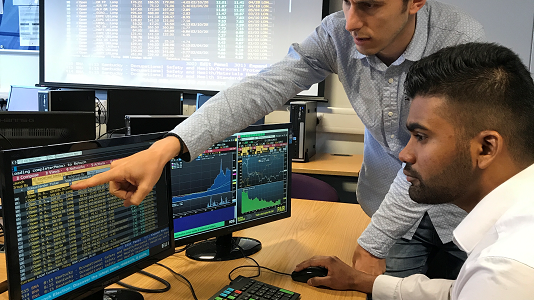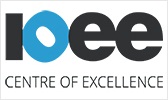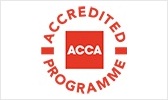Search our site...
Search module
Overview
MSc International Finance is for those working or hoping to work in finance or accounting. You'll gain an academic qualification in domestic and international financial operations and you'll address current challenges and issues facing the world's international financial institutions and markets.
The course links theory and practice in international financial matters through intensive, selective and expert orientated modules with a clearly defined business outlook. One of the main attractions of this course is that it provides a wide range of modules to suit your specific interests. The content focuses on financial markets, the analysis and management of financial intermediaries and their interaction with financial instruments, investment and risk management. This will see you studying a broad range of related topics such as asset fund management, portfolio theory and investment analysis, credit risk, and financial institutions main operations and performance within an international context.
6 reasons to study here
- trophy
- Joint 2nd in Accounting and Finance for career prospects among London universities (Guardian University League Tables 2020).
- heart
- Employability: Providing students with an individualised learning experience to develop the skills and aspirations that enable them to enter employment, further study, or start their own businesses. Students will get Bloomberg market certificate (BMC) during their study of the course.
- star
- We are top 5 for satisfaction with teaching in Accounting and Finance among London universities (Guardian University League Tables 2020) and No 7 for overall score in UK for Accounting and Finance among UK universities (Guardian University League Tables 2020).
- users
- Internationalisation: Developing a multicultural community of students and staff, which through international alliances and partnerships will further build our capacity and capabilities in education, research and enterprise.
- rocket
- Research and enterprise: Delivering outstanding economic, social and cultural benefits from our intellectual capital, by connecting our teaching and research to the real world through commercial activities and social enterprise.
- puzzle-piece
- Practicability and digital skills: The course is highly practical with a large part of it associated with the learning of Bloomberg software. You will learn practical skills in a real-world environment.
On this course you'll also take part in a residential weekend focused on personal development and in-depth learning. You'll exchange experiences and discuss current events and specific problems affecting the financial markets and institutions, with academics and a visitor practitioner.
| ModeFull-time | Duration27 months | Start dateJanuary | Application code5594 | Application method Direct to LSBU |
| ModeFull-time | Duration1 year | Start dateSeptember | Application code5724 | Application method Direct to LSBU |
Location
London South Bank University student union is located at 103 Borough Rd, London SE1 0AA.
If you are visiting our Southwark Campus, you may wish to use our downloadable campus map (PNG File 466 KB). For information on accessibility, see our DisabledGo access guides. See our location page for more details.
Entry Level Requirements
In order to be considered for entry to the course(s) applicants will be required to have one of the following qualifications:
- 2.1 honours degree in any subject from the UK or Bachelors degree equivalent to UK Second Class Upper Division; or
- 2.2 honours degree in relevant subject area; or
- Students with a non-relevant degree but with at least a 2.2. Honours and relevant work experience in financial services will be considered on an individual basis; or
- the Fundamental Level (Knowledge and Skills) of the ACCA professional examinations; or
- Completion of the Operational and Management levels of CIMA examinations; or
- Other relevant professional qualifications including from overseas.
- Required English language skills to undertake this programme IELTS (International English Language Testing Service) 6.5.
For LSBU Business School’s ‘MSc with Internship’ courses, only a limited number of English tests are accepted, and with different subscores English Requirements ‘MSc with Internship (PDF File 62 KB)
Accreditation of Prior Learning:
Applicants may be required to attend for interview by the Course Director or Admissions Tutor.
Choose your country
Select country here:
Missing English and Maths qualifications?
If you do not have the required English and Maths qualifications needed to satisfy the entry requirements for this programme, we have courses available at our partner College that you can take to upskill in these areas. Find out more at South Bank College.
United Kingdom
£12190
Tuition fees for home students
International
£19090
Tuition fees for international students
Tuition fees are subject to annual inflationary increases. Find out more about tuition fees for Undergraduate or Postgraduate courses.
-
Full-time
full-time
MSc International Finance (with Internship) (JAN) (FT) - Year 1
UK fee: £12190 International fee: £19090 AOS/LSBU code: 5594 Session code: 1FS00 MSc International Finance (with Internship) (SEPT) (FT) - Year 1
UK fee: £12190 International fee: £18090 AOS/LSBU code: 5724 Session code: 1FS00
For more information, including how and when to pay, see our fees and funding section for postgraduate students.
See our Tuition Fees Regulations (PDF File 391 KB) and Refund Policy (PDF File 775 KB).
Possible fee changes
The University reserves the right to increase its fees in line with changes to legislation, regulation and any government guidance or decisions.
The fees for international students are reviewed annually and the University reserves the right to increase the tuition fees in line with the RPIX measure of inflation up to 4 per cent.
Postgraduate loan (PGL) for Masters study
If you are starting a Masters course, studying either full- or part-time, you may be entitled to apply for a postgraduate study loan. Find out more at our postgraduate fees and funding section.
Scholarships
We offer several types of fee reduction through our scholarships and bursaries. Find the full list and other useful information on funding your studies on the scholarships and fee discounts page.
Fee status
Please check your fee status and whether you are considered a Home, EU or International student for fee-paying purposes and for our regulatory returns, by reading the UKCISA regulations.
International students
The course is not currently open to international students.
International (non Home) applicants should follow our international how to apply guide.
Home
| Mode Full-time | Duration 27 months | Start date January | Application code 5594 | Application method Direct to LSBU |
| Mode Full-time | Duration 1 year | Start date September | Application code 5724 | Application method Direct to LSBU |
Postgraduate students and research students should apply through our dedicated application system. Full details of how to do this are supplied on our How to apply section for postgraduate students and our How to apply section for research students.
See our admissions policy (PDF File 1,043 KB) and complaints policy (PDF File 516 KB).
Accommodation
Students should apply for accommodation at London South Bank University (LSBU) as soon as possible, once we have made an offer of a place on one of our academic courses. Read more about applying for accommodation at LSBU.
Finance
It's a good idea to think about how you'll pay university tuition and maintenance costs while you're still applying for a place to study. Remember – you don't need to wait for a confirmed place on a course to start applying for student finance. Read how to pay your fees as a postgraduate student.
Prepare to start
We help our students prepare for university even before the semester starts. To find out when you should apply for your LSBU accommodation or student finance read How to apply tab for this course.
Enrolment and Induction
Enrolment takes place before you start your course. On completing the process, new students formally join the University. Enrolment consists of two stages: online, and your face-to-face enrolment meeting. The online process is an online data gathering exercise that you will complete yourself, then you will be invited to your face-to-face enrolment meeting.
In September, applicants who have accepted an unconditional offer to study at LSBU will be sent details of induction, which is when they are welcomed to the University and their School. Induction helps you get the best out of your university experience, and makes sure you have all the tools to succeed in your studies.
Read more about Enrolment and Induction.
Suggested reading
- David Alexander, Anne Britton and Ann Jorissen (2011). International Financial Reporting and Analysis, 5th edition, Cengage Learning EMEA. (Chapters 9 and 23 in particular)
- Terry J. Watsham, Keith: Parramore (2015). Quantitative Methods in Finance, Edition: 2nd Thomson Business Press
- The Economist. Weekly magazine
- The Financial Times. Daily newspaper
All modules are assessed by a mix of coursework, individual and group presentations and written exams. A typical 20 credit taught module involves a total of 200 study hours (52 contact hours and 148 group and private study hours).
The use of Bloomberg is embedded within modules.
Modules
- Creativity Enterprise and InnovationThe module focuses on the rapidly changing world around us, it is imperative that students are able to think creatively, problem solve and create advantage for themselves (be entrepreneurial) and for the businesses they may work for (be intrapreneurial). The module encourages students to question what they see and experience around them with an aim to enhance their creativity and to discover new and improved ways of doing things.
- Curiosity, Creativity and Research
This module introduces students to the research process, the mindset of the researcher and in particular to the idea of creativity in research and what it means to be a ‘creative researcher’. In this module, students will identify potential topics for their practice-based dissertation and explore these with the aid of creative thinking techniques. In this way their research ideas can be refined and expressed in terms of clear research questions and objectives making use of the relevant literature and theoretical concepts. - Research in Action
The module focuses on the nature, approaches, methods, tools and techniques of research within relevant disciplines from the business environment. In doing so it attempts to develop the skills and knowledge required to complete Master’s level research where the emphasis of the research is in improving aspects of business process and business practice. Thus the module is practically oriented towards the completion of a research proposal that will form the basis of the final practice-based project module. - Management Consultancy in a Global Environment
This module is designed to develop professional consultancy skills by studying organisational structure and culture, situational analysis and diagnosis, communication strategies for consulting and group dynamics. Focusing on the development of business research; client handling and project management skills, completion of this module will enable students to prepare a succinct, clear, evidence based, persuasive consultancy led project plan , aligned to the strategic vision of an organisation and which they are able to effectively pitch to a client. - Empirical Finance
This module focuses on the use of modern econometric methodology for dealing with problems in the area of finance and provides students with the econometric tools applied in the area. It applies the techniques of mathematics, statistics and econometrics to analyse financial data so as to understand and model the underlying financial and/or economic conditions. In achieving the above, use of specialist software packages is employed. Empirical applications are considered in the stock, bond and exchange rate markets. - Corporate Financial Management
The module deals with the theory and techniques of making value-maximising investment and financing decisions based on key factors such as cash, risk and time. It also incorporates the study of the economic environment in which such decisions are taken, and addresses other specialised areas such as the profit distribution decision, merger and acquisition strategy, management of working capital and international financial management. It applies concepts and theories that are central modern financial management. - Financial Risk Management
The rapid development of financial instruments, the ever increasing speed of globalisation, the technological revolution and especially the recent ongoing financial crisis have dramatically increased the perceived risk associated with financial markets. This module focuses on a particular class of risk that businesses face in the conduct of their commercial operations, namely, financial risk. It investigates how different financial risks, e.g., market risk, credit risk, etc. can be managed. It also explains and reviews the various regulation changes that have been made to control the different type of risks. - International Financial Markets
This course provides students with a thorough understanding of the international financial markets, and the quantitative techniques used to value financial securities. Topics covered include the major global financial markets and their structures, quantitative techniques for valuing financial securities, the determinants of interest rates and its term structure and an introduction to derivatives and risk management. As part of the course, Bloomberg will be introduced and integrated into the curriculum. - Capstone Business Project
This capstone, independent research project draws upon the students’ skills and knowledge gained thus far enabling application of learning to a scenario resulting in added value to an organisation and creating real world impact. This student driven project must address a current issue or opportunity in an organisational or industrial context. Projects can relate to a student’s current role or students can use this opportunity to deepen their knowledge of different sectors or organisations thus make connections utilising the project as a vehicle to impress future employers creating a possible stepping stone to their next job. Alternatively they may wish to investigate possible entrepreneurial opportunities. - Internship
All students will study for a 20 credit internship (instead of taking two 10 credit optional modules). This module allows students to gain valuable work experience while studying their master's degree. The student is supported in finding the internship by the Employment Team.
Take an internship
All students have the option to study for a 20 credit internship (instead of taking two 10 credit optional modules). This module allows the student to gain valuable work experience while studying for a master’s degree. Responsibility for securing the work placement lies with the student. However, the student is supported during the search process and when the student is actually working. The work placement should have some direct bearing on what the student is studying - a student studying MSc International Finance would be expected to secure an internship with some connection with aspects of finance within the business community.
ACCA Exemptions
On completion of the course, you will be on a fast track to becoming ACCA qualified, and exempt from the following modules:
F1 - Accountant in Business
F2 - Management Accounting
F3 - Financial Accounting
With completion of the specific LSBU modules, you will get following further exemptions:
| LSBU module | ACCA module exemption |
|---|---|
| Corporate Financial Management (BAF-7-CFM) | F9 - Financial Management |
Facilities
Specialist industry software prepares our students with the digital skills that employers' value. Students on our programmes have access to Bloomberg, SAGE, FAME, NVivo, and SPSS.
Read more about LSBU Business School's specialist facilities and software.

Careers
Employability Service
At LSBU, we want to set you up for a successful career. During your studies – and for two years after you graduate – you’ll have access to our Employability Service, which includes:
- Free employability workshop and events for student all year round, more details can be found on our event section.
- Online board where you can see a wide range of placements: part-time, full-time or voluntary. You can also drop in to see our Job Shop advisers, who are always available to help you take the next step in your search.
- LSBU Careers Hub offering group workshops on CVs, interview techniques and support, guidance on future careers, as well as loads of career resources, connecting you with employers, exciting events, 1-1 support and relevant workshops.
Our Student Enterprise team can also help you start your own business and develop valuable entrepreneurial skills.
Graduates who possess an LSBU Masters degree in international finance are likely to be highly employable in trading and analyst positions, not only in the UK but throughout the world. Excellent career opportunities exist in finance, banking and investment. Graduates from this course have gone on to obtain positions in major international companies, financial institutions, regulatory agencies, credit rating agencies and financial consultant firms in the UK and overseas.
Past employability skills events held by the Department include:
"My Employability event"
My dream job
Preparing CVs and cover letters
Using databases to research the company
IT qualifications for your CV
Preparing for interviews
Managing expectations
The optional placement in arelevant business area enhances your employability skills and enables you to apply accounting and finance theory to contemporary business practice.
According to the electives chosen, the programme will part prepare students for some of the professional examinations of the Association of Chartered Certified Accountants (ACCA), CIMA, ICAEW and CISI.
Collaboration agreements with:
- Auston Institute of Management (Singapore and Sri Lanka)
- Pole Universitaire Leonard de Vinci (Paris)
We regularly invite guest speakers on to the course to give lectures hold events and conferences with industry experts. Past events include:
"Customer Focus in Banking: How to implement it?"
Keynote speaker: Owen Woodley, Managing Director, Lloyds Bank Retail.
Panel: Mark Mullen, Chief Executive, First Direct & Head of UK Contact Centres; Paul Lynam, CEO, Secure Trust Bank; Ashleye Gunn, Consumers Association 'Which?'; Richard Goodman, Policy Director, Financial Ombudsman.
Chairman: Chris Skinner, Chair, the Financial Services Club
"Making Corporate Governance effective in banking"
Keynote speaker: Peter Swabey, Policy and Research Director, ICSA.
Panel: Prof. Andrew Chambers, International Internal Audit Standards Board; Mike Trippit, Director, Equity Research - Banks, Numis; Catherine Howarth, CEO, Share Action; Robert Hingley, Director of Investment Affairs, Association of British Insurers; Charles Middleton, CEO, Triodos Bank.
Chairman: Simon Osborne, CEO, ICSA
"Fixing our banks: What to fix and by whom?"
Participant Speakers:
- Chris Skinner - Chairman – European Networking Forum. The Financial Services Club
- A bank's perspective: Triodos Bank – Charles Middleton
- Board of Directors and Shareholders' issues: ICSA – Patrick Gonsalves
- Employees' issues: Unite. Finance & Legal – National Officer – Dominic Hook
- Customer's issues: Which? Consumers Association. Head of Money Content – James Daley
- Regulatory issues: Internal Audit Guidance for Financial Services, set up by the FSA and the Chartered Institute of Internal Auditors – Professor Andrew Chambers
The conference discussed the different stakeholders' perspectives about the changes that should be introduced in the banking system to deal effectively with the current crisis affecting financial institutions.


Memberships

LSBU Business School is an esteemed member institution of the Business Graduates Association (BGA), an international membership and quality assurance body of world-leading and high-potential Business Schools who share a commitment for responsible management practices and lifelong learning, and are looking to provide positive impact on their students, communities, and the economy as a whole. BGA is the sister brand to the Association of MBAs (AMBA), the world's impartial authority on postgraduate management education.
As a BGA member institution, students of LSBU Business School are able to access BGA's individual membership, which offers a range of tools and resources designed to support the professional and personal development of business students and graduates, free of charge. This includes CV building services, a job search function, skill assessments, thought-leadership, partner discounts and much more.
Teaching and Assessment
This course will develop your key skills in:
- Understanding the core of international finance in the modern global marketplace
- Understanding the theoretical basis for understanding the nature of international financial operations and their complexity.
- Understanding of the employment of theoretical principles to deal with practical situations faced by investors, business and financial institutions
- Developing research problems/questions in the area of investment, banking and finance.
You will also benefit from the Department's experienced lecturers, excellent learning materials, and small class sizes. Workshops, seminars, case studies and student led discussion facilitate more active modes of learning. You'll receive training in the use of Bloomberg and Thomson-One Banker, and specialist software (SPSS and N-Vivo)during seminar sessions and in the development of assignments, and dissertation/Business Project.
Personal Tutoring
As a postgraduate student in the Business School, your personal development and wellbeing is very important to us, so we have developed a personal tutoring system that is tailored to your individual and group needs.
Firstly, you will be allocated a personal tutor who will be available to you on a 1:1 basis as well as facilitating group personal tutoring sessions, designed to enhance your academic and personal development within your postgraduate degree programme.
In addition to an allocated personal tutor, there will also be a personal tutor available ‘on call’ in a designated room, called ‘Talk’, for confidential 1:1 pastoral care meetings every day of the academic semester from 9am to 8pm. This personal tutor can be seen by appointment or within a few minutes in order to assist you with any concerns that you may have.
Our personal tutoring motto is that we want you to "Achieve, Succeed & Excel".



